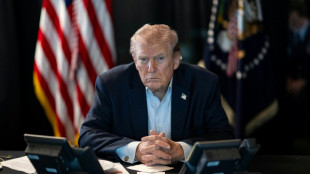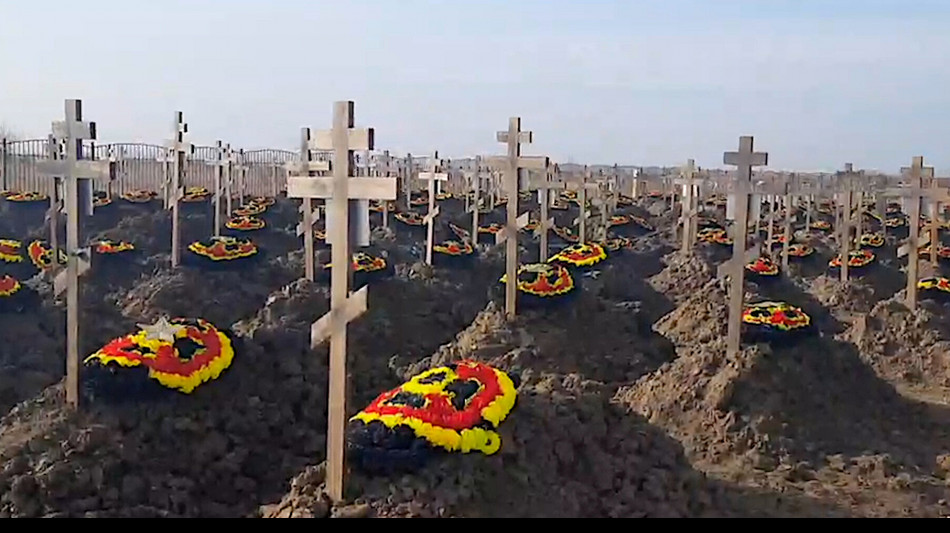-
 Afghans escape from Iranian cities to get home
Afghans escape from Iranian cities to get home
-
'Peaky Blinders' stars hit Brum red carpet for movie premiere

-
 Brazil's Flamengo sack coach Filipe Luis despite 8-0 win
Brazil's Flamengo sack coach Filipe Luis despite 8-0 win
-
England 'not fearing anything' against India, says Curran

-
 Global markets turmoil intensifies on Iran war
Global markets turmoil intensifies on Iran war
-
Iran targets Mideast energy industry and US missions

-
 Rahm accuses DP World Tour of 'extorting players' with LIV deal
Rahm accuses DP World Tour of 'extorting players' with LIV deal
-
Thousands of Afghans displaced by Pakistan conflict

-
 China, North Korea make winning starts at Women's Asian Cup
China, North Korea make winning starts at Women's Asian Cup
-
EU asylum applications down but Iran concerns mount

-
 Rahm accuses DP World Tour of 'exorting players' with LIV deal
Rahm accuses DP World Tour of 'exorting players' with LIV deal
-
Drones hit US embassy as vengeful Iran targets Mideast cities

-
 Mideast war exposes fragile oil, gas dependency
Mideast war exposes fragile oil, gas dependency
-
How the T20 World Cup semi-finalists shape up

-
 Oil extends gains and stocks dive as Middle East war spreads
Oil extends gains and stocks dive as Middle East war spreads
-
Warming El Nino may return later this year: UN

-
 Trump says US-UK relationship 'not like it used to be'
Trump says US-UK relationship 'not like it used to be'
-
Eight years on, trial begins in Argentina submarine implosion

-
 Beijing votes out three generals from political advisory body
Beijing votes out three generals from political advisory body
-
Oil extends gains and stocks dive as Iran conflict spreads

-
 The French village where Ayatollah Khomeini fomented Iran's revolution
The French village where Ayatollah Khomeini fomented Iran's revolution
-
South Africa, India eye T20 World Cup rematch as semi-finals begin

-
 Trump hosts Germany's Merz for talks eclipsed by Mideast war
Trump hosts Germany's Merz for talks eclipsed by Mideast war
-
Second-hand phones surf rising green consumer wave

-
 Pakistanis at remote border describe scramble to leave Iran
Pakistanis at remote border describe scramble to leave Iran
-
China votes to oust three generals from political advisory body

-
 Murray scores 45 as Nuggets hold off Jazz
Murray scores 45 as Nuggets hold off Jazz
-
Five things about the 2026 F1 season

-
 Scrum-half Gibson-Park: Ireland's 'petit general'
Scrum-half Gibson-Park: Ireland's 'petit general'
-
Geopolitical storm leaves isolated Greenlanders hanging by a telecoms thread

-
 Myong hat-trick as North Korea cruise at Women's Asian Cup
Myong hat-trick as North Korea cruise at Women's Asian Cup
-
AI disinformation turns Nepal polls into 'digital battleground'

-
 New Israel, Iran attacks across region: Latest developments in Middle East war
New Israel, Iran attacks across region: Latest developments in Middle East war
-
China's overstretched healthcare looks to AI boom

-
 Oil extends gains and stocks drop as Iran conflict spreads
Oil extends gains and stocks drop as Iran conflict spreads
-
Rituals of resilience: how Afghan women stay sane in their 'cage'

-
 Strait of Hormuz impasse squeezes world shipping
Strait of Hormuz impasse squeezes world shipping
-
Fresh Israel, Iran attacks across region: Latest developments in Middle East war

-
 Oscar-nominated Iranian doc offers different vision of leadership
Oscar-nominated Iranian doc offers different vision of leadership
-
Oscar-nominated docs take on hot-button US social issues

-
 'I couldn't breathe': The dark side of Bolivia's silver boom
'I couldn't breathe': The dark side of Bolivia's silver boom
-
Trump warns of longer Iran war as Riyadh, Beirut hit

-
 Underground party scene: Israelis celebrate Purim in air raid shelters
Underground party scene: Israelis celebrate Purim in air raid shelters
-
Flowers, music, and soldiers at funeral of drug lord

-
 'Safety and wellbeing' will guide F1 Mideast planning: FIA chief
'Safety and wellbeing' will guide F1 Mideast planning: FIA chief
-
Trump to attend White House Correspondents' dinner

-
 Will Iran's missiles drain US interceptor stocks?
Will Iran's missiles drain US interceptor stocks?
-
OMP Unveils Decision-Centric Planning to Accelerate Supply Chain Decision Velocity

-
 Trump warns of longer Iran war as violence spreads
Trump warns of longer Iran war as violence spreads
-
Energy infrastructure emerges as war target, lifting prices

Ishiba's Plan to Change Power in Asia
Is Japan Preparing for War? Ishiba's Vision to Redefine Power in Asia
In a world where geopolitical tensions are intensifying, Japan finds itself at a crossroads. At the centre of this discussion is Shigeru Ishiba, a prominent Japanese politician and former defence minister, whose bold proposals to reshape Japan's security policies are sparking widespread debate. Is Japan merely safeguarding its sovereignty, or is it actively preparing for conflict?
A Paradigm Shift in Japanese Defence
Since the end of World War II, Japan has adhered strictly to its pacifist constitution, particularly Article 9, which renounces the use of war as a means of settling international disputes. However, as global power dynamics evolve and regional threats grow, Ishiba and other leaders argue that Japan must modernise its approach to defence.
Ishiba has proposed a significant expansion of Japan’s military capabilities, including increased defence spending, the development of advanced technologies such as missile defence systems, and a shift towards a proactive deterrence strategy. These measures, he asserts, are necessary to counter the rising influence of China and North Korea's nuclear threat.
The Strategic Context: Asia in Flux
Japan’s strategic positioning in Asia has long been a delicate balancing act. With China's growing assertiveness in the South China Sea, Taiwan Strait, and East China Sea, Ishiba’s call for a stronger Japanese military aims to counterbalance Beijing’s influence. North Korea’s missile tests and unpredictable behaviour further exacerbate the urgency for a robust Japanese defence policy.
Ishiba’s proposals align with the broader trend of Indo-Pacific nations strengthening security alliances, including Japan's growing collaboration with the United States, Australia, and India under the Quadrilateral Security Dialogue (Quad). These partnerships are seen as essential to maintaining regional stability and ensuring a free and open Indo-Pacific.
Domestic and International Reactions
Domestically, Ishiba’s vision has faced both support and opposition. Proponents argue that his policies are pragmatic and essential for Japan’s survival in an increasingly volatile region. Critics, however, worry that such moves could escalate tensions and provoke adversaries. The debate also revives questions about the reinterpretation of Japan’s pacifist constitution and its implications for national identity.
On the international stage, Ishiba’s stance has drawn mixed reactions. Allies like the United States welcome Japan’s increased commitment to regional security, while China and North Korea view these developments as provocative and destabilising.
Preparing for Conflict or Preserving Peace?
Ishiba has repeatedly emphasised that his aim is not to prepare for war but to prevent it. He argues that a strong deterrent capability is the best way to avoid conflict and maintain peace in the region. However, critics contend that expanding Japan's military footprint could trigger an arms race and inadvertently increase the likelihood of confrontation.
The Road Ahead
As Japan navigates these turbulent waters, Ishiba’s vision represents a pivotal moment in the country’s post-war history. Whether his proposals will redefine Japan’s role in Asia or exacerbate regional tensions remains to be seen. What is certain, however, is that Japan’s future decisions will have profound implications not only for its own security but for the broader balance of power in Asia.
As the world watches, the question remains: Is Japan preparing for war, or is it merely adapting to a new era of uncertainty? In answering this question, the nation must grapple with the delicate balance between safeguarding its future and upholding the ideals that have defined its modern identity.

Три тупые свиньи: Пригожин, Шойгу и Путин!

Anti-social Russian gets a bashing as flag thief

Россия: Кто придет после военного преступника Путина?

Ukrainian army destroys Russian terror bastards

У российского террористического государства мало боеприпасов

Россия: путинские преступники заработали миллиард

Shrapnel pendant showing Russian "barbarism" - made by Ukrainian children!

Sudan: Heavy fighting continues despite ceasefire

This is how the Russian scum in Ukraine ends!

Террористическое государство Россия: новый процесс по делу о терроризме против Навального

Россия - антисоциальное террористическое государство!




